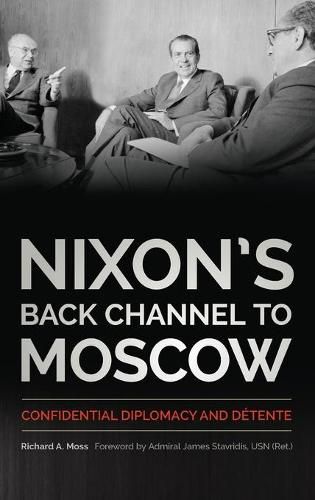Readings Newsletter
Become a Readings Member to make your shopping experience even easier.
Sign in or sign up for free!
You’re not far away from qualifying for FREE standard shipping within Australia
You’ve qualified for FREE standard shipping within Australia
The cart is loading…






Most Americans consider detente – the reduction of tensions between the United States and the Soviet Union – to be among the Nixon administration’s most significant foreign policy successes. The diplomatic back channel that national security advisor Henry Kissinger established with Soviet ambassador Anatoly Dobrynin became the most important method of achieving this thaw in the Cold War. Kissinger praised back channels for preventing leaks, streamlining communications, and circumventing what he perceived to be the US State Department’s unresponsive and self-interested bureaucracy. Nixon and Kissinger’s methods, however, were widely criticized by State Department officials left out of the loop and by an American press and public weary of executive branch prevarication and secrecy. Richard A. Moss’s penetrating study documents and analyzes US-Soviet back channels from Nixon’s inauguration through what has widely been heralded as the apex of detente, the May 1972 Moscow Summit. He traces the evolution of confidential-channel diplomacy and examines major flashpoints, including the 1970 crisis over Cienfuegos, Cuba, the Strategic Arms Limitations Talks (SALT), US dealings with China, deescalating tensions in Berlin, and the Vietnam War. Moss argues that while the back channels improved US-Soviet relations in the short term, the Nixon-Kissinger methods provided a poor foundation for lasting policy. Employing newly declassified documents, the complete record of the Kissinger-Dobrynin channel – jointly compiled, translated, annotated, and published by the US State Department and the Russian Foreign Ministry – as well as the Nixon tapes, Moss reveals the behind-the-scenes deliberations of Nixon, his advisers, and their Soviet counterparts. Although much has been written about detente, this is the first scholarly study that comprehensively assesses the central role of confidential diplomacy in shaping America’s foreign policy during this critical era.
$9.00 standard shipping within Australia
FREE standard shipping within Australia for orders over $100.00
Express & International shipping calculated at checkout
Most Americans consider detente – the reduction of tensions between the United States and the Soviet Union – to be among the Nixon administration’s most significant foreign policy successes. The diplomatic back channel that national security advisor Henry Kissinger established with Soviet ambassador Anatoly Dobrynin became the most important method of achieving this thaw in the Cold War. Kissinger praised back channels for preventing leaks, streamlining communications, and circumventing what he perceived to be the US State Department’s unresponsive and self-interested bureaucracy. Nixon and Kissinger’s methods, however, were widely criticized by State Department officials left out of the loop and by an American press and public weary of executive branch prevarication and secrecy. Richard A. Moss’s penetrating study documents and analyzes US-Soviet back channels from Nixon’s inauguration through what has widely been heralded as the apex of detente, the May 1972 Moscow Summit. He traces the evolution of confidential-channel diplomacy and examines major flashpoints, including the 1970 crisis over Cienfuegos, Cuba, the Strategic Arms Limitations Talks (SALT), US dealings with China, deescalating tensions in Berlin, and the Vietnam War. Moss argues that while the back channels improved US-Soviet relations in the short term, the Nixon-Kissinger methods provided a poor foundation for lasting policy. Employing newly declassified documents, the complete record of the Kissinger-Dobrynin channel – jointly compiled, translated, annotated, and published by the US State Department and the Russian Foreign Ministry – as well as the Nixon tapes, Moss reveals the behind-the-scenes deliberations of Nixon, his advisers, and their Soviet counterparts. Although much has been written about detente, this is the first scholarly study that comprehensively assesses the central role of confidential diplomacy in shaping America’s foreign policy during this critical era.